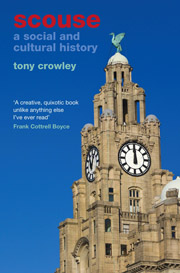Book contents
- Frontmatter
- Contents
- Acknowledgements
- Preface Liverpool: language, culture and history
- 1 The sea, slavery and strangers: observations on the making of early modern Liverpool and its culture
- 2 Language in Liverpool: the received history and an alternative thesis
- 3 Language and a sense of place: the beginnings of ‘Scouse’
- 4 Frank Shaw and the founding of the ‘Scouse industry’
- 5 What is ‘Scouse’? Historical and theoretical issues
- 6 Liverpools: places, histories, differences
- Appendix. Stories of words: naming the place, naming the people
- Bibliography
- Index
5 - What is ‘Scouse’? Historical and theoretical issues
- Frontmatter
- Contents
- Acknowledgements
- Preface Liverpool: language, culture and history
- 1 The sea, slavery and strangers: observations on the making of early modern Liverpool and its culture
- 2 Language in Liverpool: the received history and an alternative thesis
- 3 Language and a sense of place: the beginnings of ‘Scouse’
- 4 Frank Shaw and the founding of the ‘Scouse industry’
- 5 What is ‘Scouse’? Historical and theoretical issues
- 6 Liverpools: places, histories, differences
- Appendix. Stories of words: naming the place, naming the people
- Bibliography
- Index
Summary
Liverpool is rich in natural traditions. (Fritz Spiegl, Scouser Songs, 1962)
In a clear piece of codology, Shaw reported a claim by Farrell that there was ‘evidence that Scouse was spoken hereabout at least 900 years ago’ from a scroll found in a cave by the Cast Iron Shore. The text reported an exchange between two archers: ‘I think our bows should be made with oak’, one declared; ‘Why, what's the matter wid yew?’ said the other (Shaw 1963b: 6). In fact, as the last two chapters have demonstrated, ‘Scouse’ emerged as a category used to name the language of Liverpool at a very recent date. Skeat has no entry for the term with this meaning in his Etymological Dictionary of the English Language (1882), nor does Wright in his English Dialect Dictionary (1898–1905), and there is nothing in the first five editions of Partridge's slang dictionary (1937–1961). The 1989 edition of the OED does include the term in this sense, with the definition: ‘the dialect of English spoken in Liverpool. Also, the manner of pronunciation or accent typical to the “scouse”.’ Symptomatically, the first supporting quote (1963) refers to the Beatles and the second is to the ABZ of Scouse (1966), volume two of the Lern Yerself Scouse series. And yet as was shown in chapter three, the OED record is wanting since there were earlier and more illustrative examples of the use of ‘Scouse’ to refer to language, with perhaps the earliest featuring in the title of Shaw's ‘Scouse Lingo – How It All Began’ (Shaw 1950c: 4).
- Type
- Chapter
- Information
- ScouseA Social and Cultural History, pp. 87 - 114Publisher: Liverpool University PressPrint publication year: 2012

